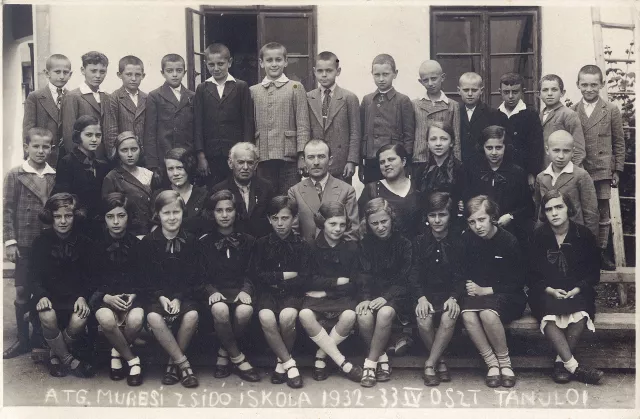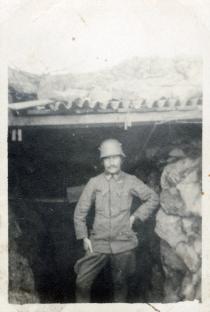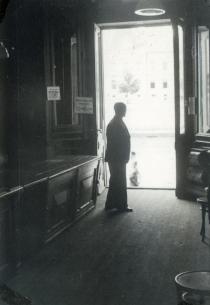Jeno Moskovits with his pupils
This is a picture of my father Jeno Moskovits and his pupils at the Jewish elementary school in Marosvarsahely. ‘Targu Mures, 15th June 1933, Jutka Haim, 4th year student' - this is written on the back of the photo.
Jutka Haim's younger sister was my classmate - in the first row, the fourth girl from the left. My classmate didn't come back from deportation, but Jutka did and she managed to keep this picture.
She gave it to me because my father is on it, and she thought it was more important for me than for her to have it. Jutka got married very early, right after World War II, after she came home. She emigrated to Israel and I haven’t heard about her since.
My father became the principal of the Jewish elementary school, and he was a principal-teacher because he taught, too. He didn't teach me, though.
Back then the same teacher followed a class through the four grades, just like today, and my class was assigned another teacher, Ferenc Rado, who started a new 1st-grade class. He is the grey-haired man in the picture.
There were four teachers at the school, two male and two female, and Mr. Deutsch came as the fifth, but he only taught Ivrit. The two women were Boske Rosenfeld and Ilona Kohn. Only this Ilona Kohn - sitting in the second row fourth from left - survived the deportation.
After the war she had a higher rank, and she even became a school commissioner. She got married before the war to Erno Salamon. I think he was taken away to forced labor in Russia and never came back. After she returned from the deportation, she remarried. All the other teachers of the Jewish elementary school perished in Auschwitz.
Back then both elementary school and high school teachers tried to maintain a distance; students respected them very much, and there wasn't this familiar atmosphere you can see now.
Children were treated differently then even within the family, and problems weren't discussed openly in front of the children, as you see today.
They were never informed if there were difficulties, conflicts or discussions because it was thought it wasn't suitable for the children to be aware of them. There were no discussions in front of them, and they became adults much later than they do today.
At school the punishments were standing in the corner, pulling the ears and caning the palms - but students were never beaten. The child had to hold out his palms, and the teacher gave them a smack with a ruler or a cane.
The rabbi never punished us, but when he asked us something and one wasn't too happy to answer, he used to ask, 'Are you telling the truth? Let's see!'
Then he used to put his finger one one's nose saying, 'Your nose is too soft, you didn't tell me the truth.' Then we used to admit that it wasn't quite that way, it happened otherwise.






























